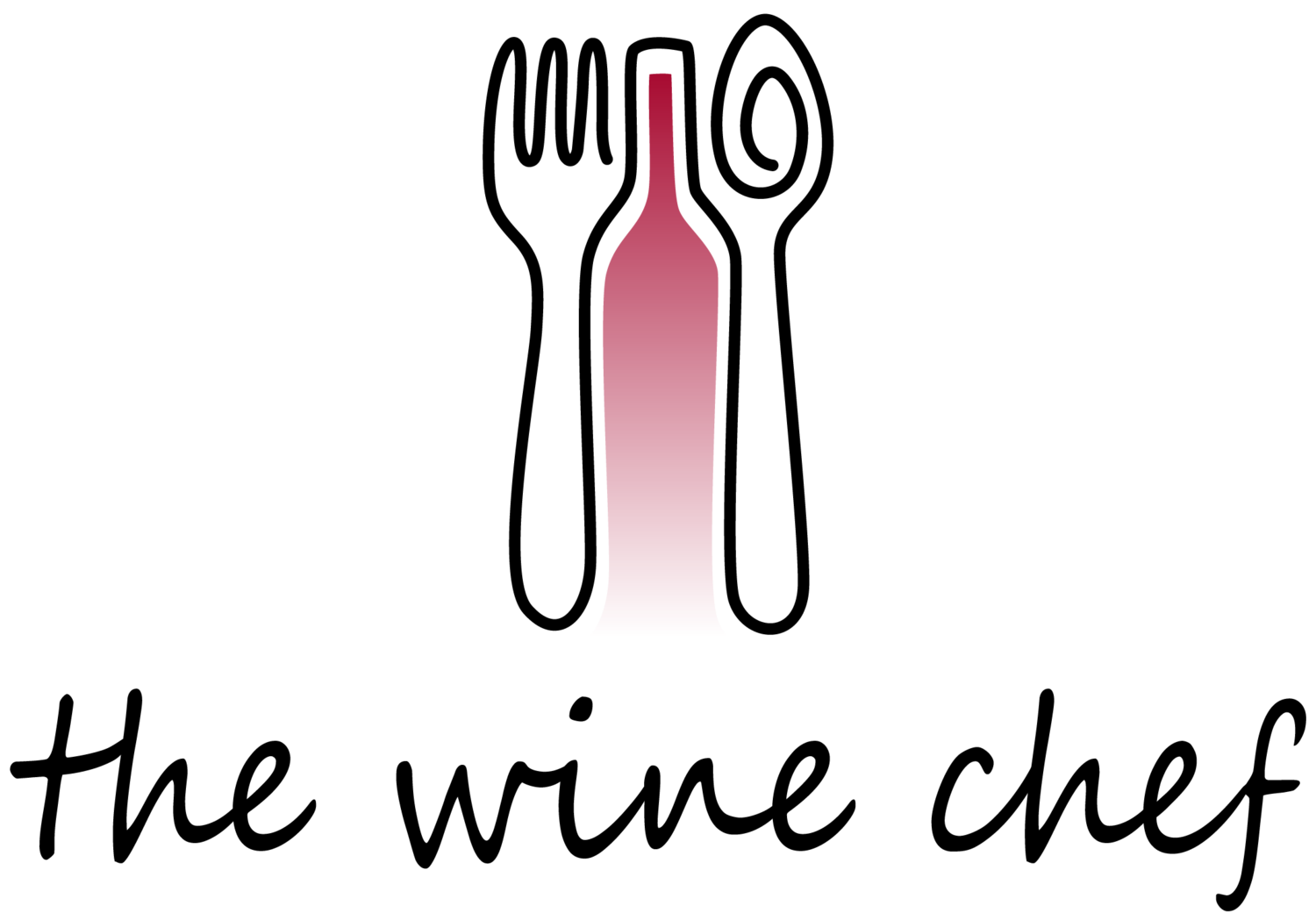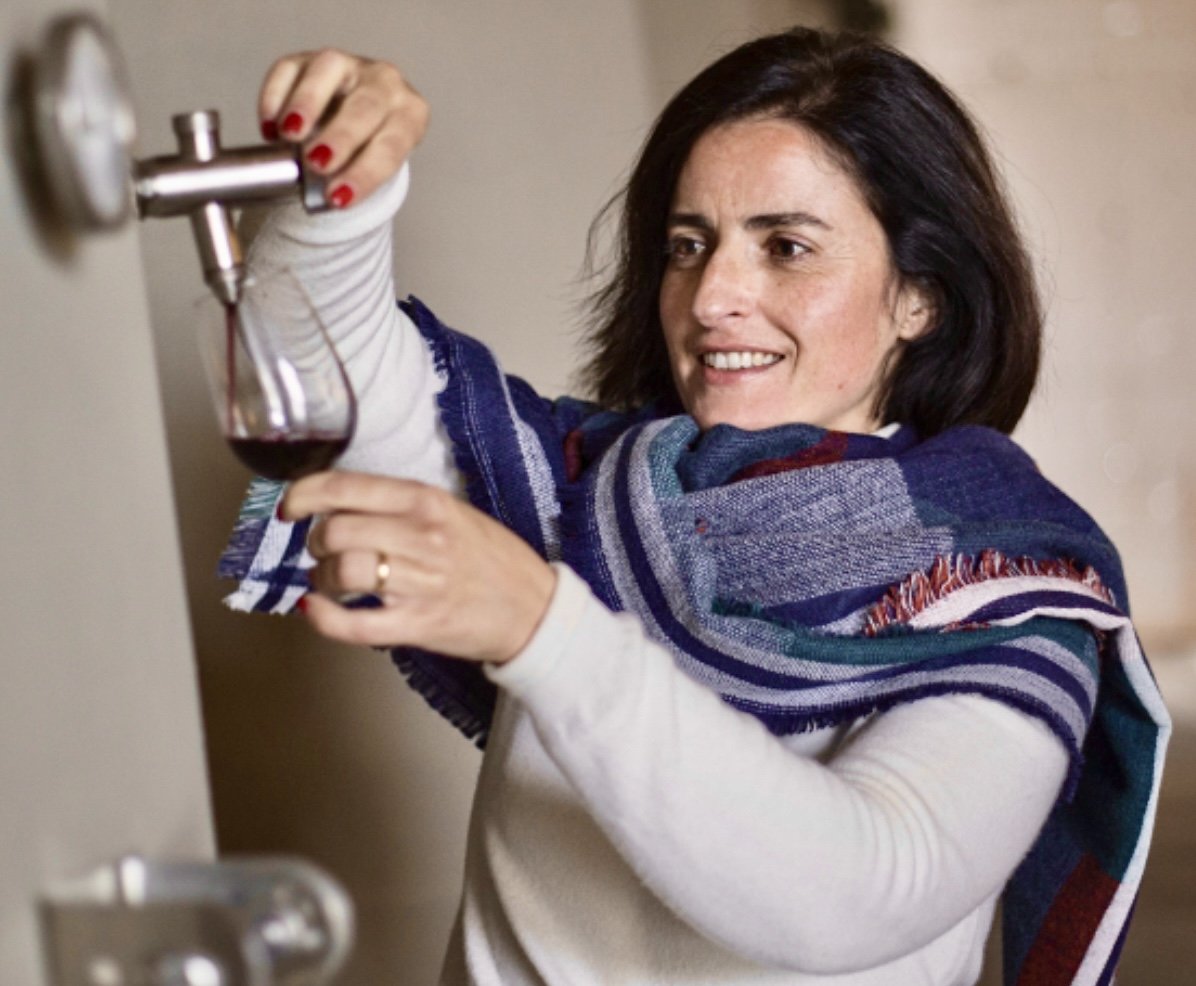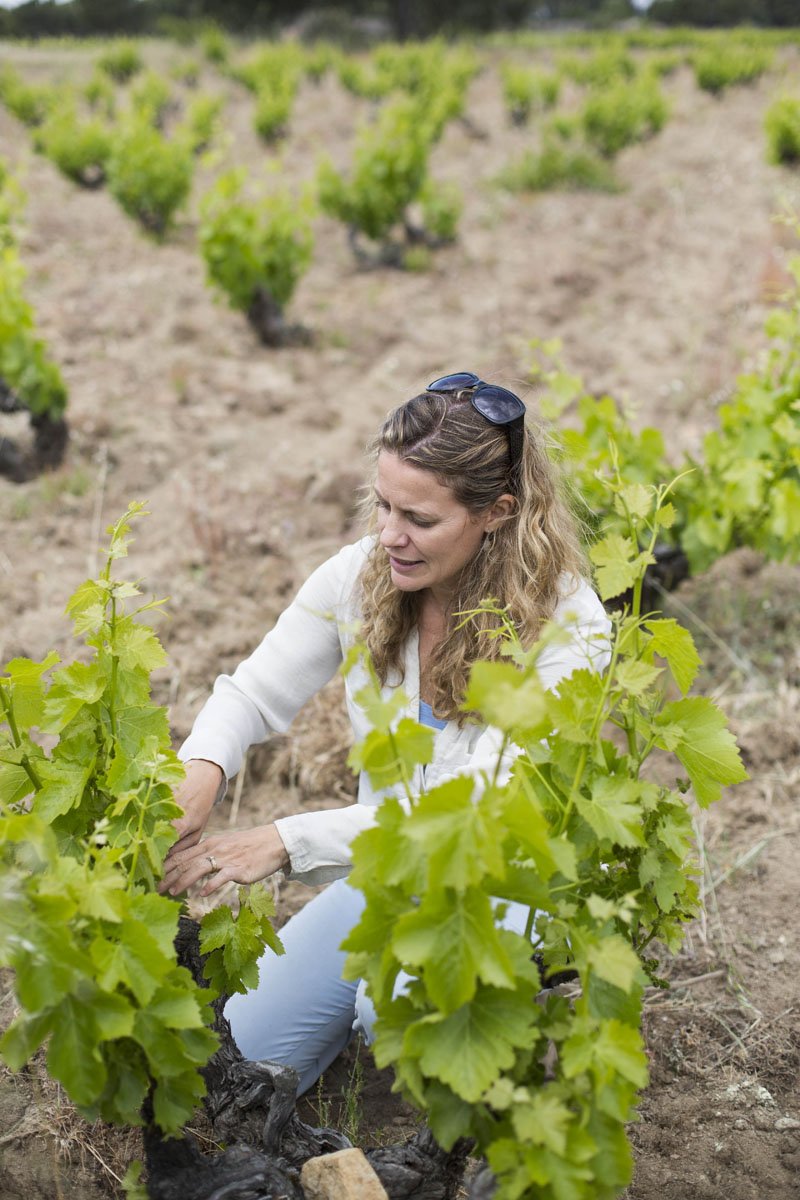Celebrating International Women's Day With Eight Remarkable Women Winemakers
/When Elena Pozzolini graduated from the University of Pisa with a degree in viticulture and enology, she enthusiastically began a wine consulting career. Her specialty was vineyard diseases and she had been hired by a few Italian wineries whose vines had been decimated by mold and mildew. It was 2006, and she had learned the most up-to-date procedures for keeping vines healthy and she was raring to go.
Unfortunately, the vineyard and cellar workers, mostly older men, wouldn’t listen to her ideas.
Elena Pozzolini
“They wouldn’t accept what I was teaching them,” says Pozzolini. “I was disappointed because I didn’t expect an old man’s world full of narrow-minded thinking.”
Fortunately, Pozzolini didn’t give up on her dreams. “In the end, I have to be thankful for what happened because it led me to look for different realities,” she says. “I started to travel around the world and found the new world to be much more open minded.” She completed harvests in Argentina, Australia and California, where people were, as she says, “interested in my opinion.”
Unfortunately, Pozzolini’s experience is not unique. Women often struggle to be heard and taken seriously in the work setting. In recognition of Women’s History Month, and International Women’s Day, today, March 8th, I spoke with several leading female winemakers to find out how they are faring in an industry where, for decades, men have run the show.
As a topic dear to women’s hearts, the huge response I received from women all across the winemaking world was incredible. These women want to share their stories. And to shine a spotlight on all of them, I’ve decided to break the article up into two parts. The second will post later in March, a month devoted annually to women’s issues. Hopefully, these stories, and others like them, will help reduce sexism in the workplace and lead to, as one female winery owner told me, “not having this conversation in the first place!”
Let’s start with the good news. Overall, despite ongoing challenges, the situation in the wine industry is looking up. And not only for women, since men can benefit from gender equality as well. The more seasoned women I spoke with said that they have seen most of the change occurring over the past couple of decades. There were even a few winemakers who said that their experience had only been positive; the youngest relaying how fortunate she has been to follow a generation of strong female leaders.
I asked these inspiring women about the challenges they have faced, what they hope gender equality will look like in ten years and what they are doing at their workplaces to increase gender equality.
Finally, I asked them for their advice. How would they counsel a young woman starting out at a winery?
Here are eight remarkable women winemakers who are facing workplace difficulties head on, and acting as encouraging role models for the next generation of women in wine.
Elena Pozzolini, Tenuta Sette Cieli, Tuscany.
Overcoming the initial setbacks to her career in wine, Pozzolini is now CEO and head winemaker at award-winning winery Tenuta Sette Cieli where she guides the vines to express a true reflection of a Tuscan landscape that’s just a stone’s throw from the ocean. She was included in Wine Enthusiast Magazine's list of Ten Trailblazing Women Leading the Wine Industry Forward.
Pozzolini notes that while it used to be almost impossible to see women in charge at wineries, things have changed a lot during the last 15 years. Most importantly, she advises women to be aware and to deal with situations head-on, like the time she fired a man who didn’t want to have a woman as his boss.
“Women have always had to face double the difficulties in the same working situation as a man,” says Pozzolini. “There have been hundreds of unpleasant situations that I had to live with, but the important thing is not to give up, not to allow anyone to prevent us from achieving our dreams or passions.”
Claudia and Giulia Benazzoli, Benazzoli Winery, Bardolino, Italy.
The Benazzoli family has been growing and selling wine grapes near Lake Garda in northern Italy for four generations. Claudia and her sister Giulia took over from their father in 2006 after studying enology and agronomy, and in 2009, they began bottling, for the first time, a small selection of top-quality wines under the Benazzoli name. They also took charge of working the vineyards, which at the time were fields run mainly by men.
Claudia and Giulia Benazzoli. Two women that know how to work hard and play hard!
“We faced a double prejudice,” says Claudia. “First because we are women, and of course ‘incapable’ of properly leading a company as men would do, and second because we are young, so inexperienced and unprepared.”
Since the recent passing of their father, Claudia says that she and Giulia are facing these kinds of preconceptions even more. Fortunately, their father's confidence and strong work ethic lives on in them, helping to deal with negative situations.
“During his life,” she says, “he transmitted to us skills, expertise and self-esteem for the work that we do every day with passion and pride. We learned how to ignore negative and useless criticism. We think that our work speaks for us.”
Looking to support female wine producers in a male-centric industry, the sisters, in partnership with women winemakers from around Italy, have also created an association called Vignaiole 2.0, whose slogan is “strength in union.” This kind of networking has been occurring between men for centuries, helping them to grow both personally and professionally, and now it is time, they say, for women to get on board.
Alice Paillard, Champagne Bruno Paillard, Reims, France.
Paillard is one of the most dedicated, hard working, passionate winemakers I’ve met. When I visited the winery in 2014 she graciously spent two hours of her time with my husband and I, giving detailed information, not only about her family’s vineyards and winemaking process, but of the entire Champagne region, her native land of which she is extremely proud. She made sure to introduce us to her father, the winery’s namesake, who founded the winery over 40 years ago at the tender age of 27 without any grapes, land, or capital, just a wealth of knowledge and 50,000 francs from trading in his vintage Jaguar.
Alice Paillard
Since Alice’s story is one of family transmission, she says that being a woman has not been one of the challenges she has faced getting where she is today: the main shareholder and future CEO of her family’s boutique Champagne House. That being said, she acknowledged that gender issues are “a deep and delicate subject” and pointed out that the rules of the game were set by men.
“I am convinced that many women today don’t accept certain responsibilities,” she says, “not because they are afraid to or lack confidence, but because the way they are asked to handle things is not their way.” Her hope is that women do not need to “behave as men” to receive the same level of success.
A strong advocate of work-life balance, and the mother of three young children, Paillard believes that true equality can only come when a company’s philosophy allows a woman, as well as a man, to take on high levels of responsibility in a way that does not conflict with her or his personal and family life.
As a woman running an internationally acclaimed Champagne House, Paillard says that multitasking between her job’s responsibilities while building a family is the rule for her. She often wonders if she is dedicating enough time to her family and thinks that men don’t feel that same kind of uncertainty about work-life harmony as women do.
“Doubt is something very few men speak about, as if it were a sign of weakness,” she says. “Maybe it is, or maybe it is what keeps you alive and alert!”
Paillard believes that change can come with the hiring of women and will continue with a work culture of listening carefully. “By that I mean creating a space for discussion where everyone’s needs can be expressed without judgement and where people aren’t afraid to ask, ‘Can I have some work days from home?’ or ‘Can I switch my Friday working time?’
Paillard is hopeful for the next generation and wishes for more women in positions of leadership, especially on the production side of winemaking. “I do believe we will be helped,” she says, “and even pushed, by the wishes of the coming generation.”
Samra Morris, Alma Rosa Winery, Santa Barbara, CA.
A native of Sarajevo, Bosnia, Morris has the distinction of being the first Bosnian American to rise to the role of head winemaker in California. Growing up around wine with a wine-loving father, Morris never thought that one day she could be a winemaker. She had only seen men in that role.
Moving to California in 2013 allowed Morris to follow her passion for wine by working at several wineries in the Napa Valley. In 2019 she headed south, landing a job as assistant winemaker at Alma Rosa Winery in the Sta. Rita Hills AVA of Santa Barbara County. Morris, now head winemaker, believes this cool climate appellation is one of the few places in California capable of producing truly great Pinot Noir and Chardonnay.
Samra Morris
Morris, one of the fortunate ones, says her experience as a woman in the wine industry has been nothing but positive.
“Through all of my experiences,” says Morris, “everyone has been supportive and provided all the help that I needed to grow and become the winemaker that I am today.”
Since becoming the winemaker at Alma Rosa Winery, she has had the opportunity to work closely with consulting winemaker Tony Biagi, an accomplished industry veteran.
“I don’t have enough words to describe what a wonderful teacher and positive mentor he is for me,” says Morris.
One area Morris pointed out that needs improvement concerns equal pay. “Women deserve to be paid the same as men for the same position and education level.” And, she, too, hopes to see more women on the production side of wine in the future.
Morris’s advice for a young woman who’s starting out at a winery? “To never give up!” she says. “Cellar work is hard. It can be intense, requires a lot of labor and is challenging for anyone. I always try to encourage women that it is possible to succeed, and I am a perfect example of that!”
Erica Orr, Orr Wines, Woodinville, Washington.
Erica has a masters degree in viticulture and enology, and she has worked at some of the best wineries in the world, including Rudd Estate, Cain Vineyards, and Domaine Dujac. In 2005, she moved to Washington State and started a winemaking consulting business. In 2013, Orr launched her own wine label, Orr Wines, with the inaugural release of 116 cases of old vine Chenin Blanc. Today, in addition to her highly-rated Chenin Blanc, she produces noteworthy Grenache, Merlot and Chardonnay.
Erica Orr
When Orr started a masters program at UC Davis in 1999, she says that women winemakers were rare. “That sort of set the tone for my career,” she says. It feels normal for me to be in the minority, and most of my winery clients are men. It is very common for me to be the only woman at a tasting group.”
Orr wishes there was more diversity in every regard in Washington State’s wine industry. “I think we could be drinking more interesting wines,” she says, “if there was more diversity in grape growing, wine production, winery management, wine journalism, etc., and I hope that 10 years from now, seeing women in those different roles within the wine industry will be normalized.”
One way Orr helps build a supportive community is through networking. “I organize a happy hour for women in wine production here in Woodinville,” she says. “I like the idea of hosting a ‘brave space’ for us to get together and share a glass of wine. I feel like the wine guys I know go to the bar after work for a beer and that’s how they find out about cool job opportunities or interesting grapes for sale, just by ‘dude’ word of mouth, before they are officially posted.”
The happy hours include women of all ages: cellar workers, enologists, assistant winemakers, women just starting their own brands, more seasoned winery owners, and they give everyone a chance to unwind and laugh, as well as to “talk shop.”
“We have swapped recommendations for label designers, bookkeepers and distributors in other markets,” she says. “I would love it if we talked more about vineyard contract negotiation or workplace management issues, too.”
Orr offers what she believes is valuable advice for women starting out: get a formal education in enology and viticulture. “My degree from Davis brings clout to my enology lab,” she says, “and my friendships with my old classmates have proven to be meaningful and enriching both professionally and personally.”
Sandra Alves, Herdade do Esporão, Alentejo, Portugal.
As Director of Winemaking at Alentejo’s best-known winery, Sandra Alves holds one of the most visible and demanding winemaking jobs in Portugal. A talent for science and chemistry, combined with a love of the land and the outdoors led to a degree in oenology, followed by a master’s degree in viticulture and oenology.
Sandra Alves
Alves has shepherded Herdade do Esporão to organic certification and has increased the production of noteworthy white wines in a region dominated by reds.
Alves says when she started out two decades ago, women winemakers were a novelty, and she takes pride in what she has accomplished.
“I saw it as an opportunity and took it to be a privilege to start on a career path that had until then tended to be performed by men,” says Alves. “I had to learn and develop the ability to adapt to challenges, professional and personal, with resilience and optimism. I had to believe in myself and to invest in a profession I was really passionate about.”
Alves would like gender to cease being viewed as a differentiating factor, and would like people to “overcome the perception that women cannot do it all.”
Isabel Galindo, Las Moradas de San Martin, Madrid, Spain.
Situated on the Madrid side of the Gredos range of hills, Las Moradas de San Martín has recovered ancient Garnacha vineyards that have been cultivated since the 12th century. A lover of Garnacha and devoted to the vineyards, Isabel is one of the pioneers of the area. For the past 20 years has been “unlearning” Garnacha, as she calls it, using a minimalist approach in which the grape is the star of the show.
Galindo’s work with 22 hectares of organically grown Garnacha vines planted at high altitudes in granite soils results in some of Spain’s finest Garnacha, big and bold yet somehow more refined and ethereal than most Garnacha from the rest of Spain.
Isabel Galindo
Galindo says that being a woman has never prevented her from achieving her goals, even if there were times when she felt that she had to try harder to prove herself.
“I felt I had to do more than I would if I were a man,” she says. “But I am of the opinion that when you work hard, you end up proving your worth and in the end, you end up receiving the respect and recognition of your environment.”
Galindo says the presence of women in wineries has increased a lot over the years and that nowadays it is normal to find certain departments, like marketing, wine tourism and administration, in which the majority are women. However, like several of the others I spoke with, she also hopes to see more women working on the production side of wine in the future.
Her advice to a young woman starting out in the wine industry? “There are no limits or obstacles other than those we create for ourselves,” she says. “Above all, you have to have confidence and passion, and present yourself in the industry with pride for all that you do and can offer.”
Stay tuned for Part 2 of The Wine Chef’s women in wine series, featuring the following leaders of the wine industry.
From California
Kathleen Inman of Inman Family Wines
Naoko and Maya Dalla Valle of Dalla Valle Winery
Elizabeth Bourcier of Bionic Wines
Theodora Lee, Theopolis Vineyards
From Spain
Mercedes García Rupérez of Bodegas Montecillo
From Italy
Patricia Toth of Planeta Winery
Roberta and Alessandra Stelzer, Maso Martis
From Argentina
Patricia Ortiz of Zolo Wines












